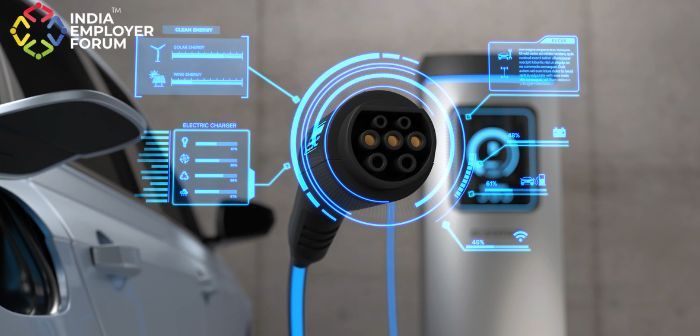The electric vehicle (EV) industry is experiencing a remarkable surge, driven by technological advancements, environmental concerns, and government incentives. This growth is creating a wealth of opportunities for professionals with diverse skills and expertise. As the industry evolves, new job profiles are emerging, requiring a blend of traditional and specialised skills. Here are the essential skills and job profiles in the EV industry that can provide insights into how you can position yourself for success in this dynamic sector.
The evolution of the EV industry
The EV industry has evolved significantly from its early days of limited-range electric cars. Today, it encompasses a wide range of vehicles, from electric scooters and bikes to buses and trucks. The shift towards electric mobility is driven by the need to reduce greenhouse gas emissions, decrease dependence on fossil fuels, and create a sustainable transportation ecosystem. With major automakers and startups alike investing heavily in EV technology, the demand for skilled professionals in this field is skyrocketing.
Required key skills
Professionals with expertise in electrical and electronics engineering are crucial for designing, developing, and testing electric powertrains, battery management systems, and charging infrastructure. Key skills in this area include circuit design, power electronics, battery technology, and embedded systems. Mechanical engineers play a vital role in the design and manufacturing of vehicle components, ensuring the structural integrity, safety, and performance of EVs. Skills such as thermal management, material science, CAD and simulation, and manufacturing processes are essential.
The EV industry also relies heavily on software for vehicle control, connectivity, and data analysis. Software developers and data analysts are needed to create the digital infrastructure that supports EVs. Essential skills here include embedded software development, connectivity and IoT, data analytics, and artificial intelligence. Additionally, as the industry aims to reduce its environmental footprint, professionals with expertise in environmental science and sustainability are in high demand. Key skills in this domain include life cycle assessment, sustainable design, regulatory compliance, and renewable energy integration.
Furthermore, the rapid growth of the EV industry requires skilled business and management professionals to navigate market dynamics, develop strategies, and drive innovation. Project management, supply chain management, marketing and sales, and financial analysis are crucial skills in this regard.
Emerging job profiles
Battery engineers specialise in the design, development, and testing of batteries for EVs, working on improving battery performance, energy density, and safety. This role requires a strong background in chemistry, materials science, and electrical engineering. Electric powertrain engineers focus on the development of electric motors, power electronics, and drivetrains, enhancing the efficiency, performance, and reliability of these components. Knowledge of mechanical and electrical engineering is essential for this role.
Charging infrastructure specialists are responsible for planning, installing, and maintaining EV charging stations, ensuring that networks are accessible, reliable, and compatible with various EV models. Expertise in electrical engineering, project management, and regulatory compliance is necessary. Autonomous vehicle engineers work on developing self-driving technology for EVs, designing and implementing systems for vehicle perception, decision-making, and control. This role involves expertise in computer science, robotics, and AI.
Sustainability analysts evaluate the environmental impact of EVs and develop strategies to minimise their carbon footprint, conducting life cycle assessments, monitoring regulatory compliance, and promoting sustainable practices within the industry. Knowledge of environmental science and sustainability is key. EV product managers oversee the development and launch of electric vehicles, working closely with engineering, marketing, and sales teams to ensure that products meet market needs and achieve business goals. Strong project management, communication, and analytical skills are required for this role.
Vehicle integration engineers ensure that all components of an EV work seamlessly together, coordinating the integration of electric powertrains, batteries, software, and other systems. Expertise in systems engineering and project management is crucial. Electric vehicle technicians are responsible for the maintenance and repair of EVs, diagnosing issues, performing repairs, and conducting routine maintenance to keep EVs in optimal condition. Technical skills in automotive repair and electrical systems are essential for this role.
Preparing for a career in the EV industry
Pursuing a career in the EV industry typically requires a strong educational background in engineering, computer science, environmental science, or business. Many universities and technical institutions now offer specialised programs and courses focused on electric mobility and related technologies. Additionally, obtaining certifications in areas such as project management, data analytics, and sustainability can enhance your qualifications.
Gaining hands-on experience through internships, co-op programs, or entry-level positions is crucial for building a successful career in the EV industry. Working with established automakers, startups, or research institutions can provide valuable insights and practical skills. Networking with industry professionals and attending conferences and workshops can also help you stay updated on the latest trends and developments.
Continuous learning is essential in the rapidly evolving EV industry, with new technologies and innovations emerging regularly. Engaging in online courses, attending webinars, and participating in professional organisations can help keep your skills up-to-date. Staying informed about industry news, government policies, and market trends can provide a broader perspective on the sector’s direction.
The EV industry is at the forefront of a global shift towards sustainable transportation. As the sector continues to expand, the demand for skilled professionals with diverse expertise will only grow. By developing the necessary skills and gaining relevant experience, you can position yourself for a rewarding career in this dynamic and impactful industry. Whether you are an engineer, software developer, sustainability expert, or business professional, the EV industry offers a wealth of opportunities to contribute to a greener and more sustainable future. Embrace the challenge, stay informed, and be a part of the revolution that is driving us towards a cleaner, greener future.
References:
- Booming Career Opportunities In The Electric Vehicle Industry | Youth Inc Mag | June 2024
- How to build a career in the EV Sector | The Economic Times | July 2023
- Top In-Demand Skills and Job Roles in Booming EV Industry in India | Imperial Society | March 2024
You might also be interested to read: Revolutionising the Manufacturing Industry: Embracing Industry 4.0 for a Prosperous Future




